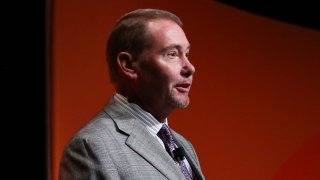
- Jeffrey Gundlach believes interest rates are about to trend lower as the economy deteriorates further and tips into a recession next year.
- The Federal Reserve's rate-setting committee unanimously agreed Wednesday to hold the key federal funds rate in a target range between 5.25% to 5.5%.
- Fed Chair Jerome Powell said Wednesday that the rate-setting committee hasn't begun considering a rate cut, and it won't until inflation is brought under control.
DoubleLine Capital CEO Jeffrey Gundlach believes interest rates are about to trend lower as the economy deteriorates further and tips into a recession next year.
"I do think rates are going to fall as we move into a recession in the first part of next year," Gundlach said Wednesday on CNBC's "Closing Bell."
We've got the news you need to know to start your day. Sign up for the First & 4Most morning newsletter — delivered to your inbox daily. >Sign up here.
The Federal Reserve's rate-setting committee unanimously agreed Wednesday to hold the key federal funds rate in a target range between 5.25% to 5.5%, where it has been since July. This was the second consecutive meeting that the central bank chose to keep rates static, following a string of 11 rate hikes, including four in 2023.
The so-called "bond king" pointed to a few signs of an economic slowdown. Firstly, the unemployment rate, while still low, has been trending higher. Secondly, the key spread between 2-year and 10-year Treasury yields has stayed inverted for more than a year, and has recently started to steepen, which is a recession signal, he said. He also saw an initial wave of layoffs.
"I really believe that layoffs are coming," Gundlach said. "We've seen hiring freezes, and now we're starting to see layoff announcements … they're out there [for] financial firms and technology firms, and I believe that's going to spread."
Money Report
Gundlach also sounded an alarm over the growing federal deficit, which ballooned to nearly $1.7 trillion at the end of the latest fiscal year that ended in September. The budget shortfall adds to the staggering U.S. debt total, which stood at almost $34 trillion.
"One thing that the market is going to have to confront is we cannot sustain these interest rates and this deficit any longer," Gundlach said. "We can't afford this government that we're running at today's interest rate level. It's completely unsustainable."
Billionaire investor Stanley Druckenmiller earlier Wednesday echoed similar concern about government spending, saying the U.S. opted not to issue debt at low, long-term rates in past years, which will ultimately lead to tough choices in the future, such as cutting entitlement programs including Social Security.
As for the Fed's next move, Gundlach said the central bank is not going to be as aggressive as the current dot plot signals, which suggested one more rate hike this year.
Fed Chair Jerome Powell said Wednesday that the rate-setting committee hasn't begun considering a rate cut, and it won't until inflation is brought under control.
Don't miss these stories from CNBC PRO:
- Bank of America's investment strategist says the S&P 500 correction could last until it hits this level
- A 'panic spike' is possible late October into November, says Bank of America's chart analyst
- The S&P 500 has entered a correction. Here's why Warren Buffett likely thinks that's good news
- Morgan Stanley auto analyst Jonas says investors are 'waking up' to idea that Ford, GM are not a way to play EV boom






